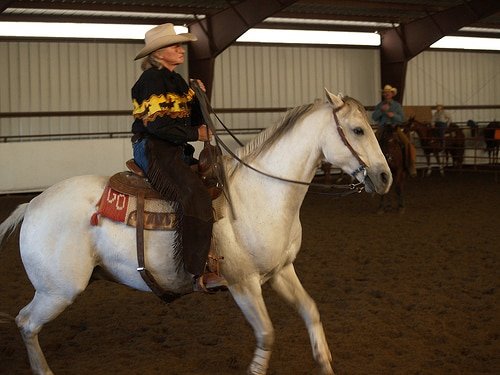

You’ve got a wonderfully trained horse. He’s dead broke, bombproof even, if there is such a thing. He listens to your every cue, attentive to the smallest shifts of body weight, the slightest twitch of the reins. He’s perfect in every way…until you let the reins out, put your hand down, and stop riding. Suddenly he falls apart. His head shoots up, his eyes go wild, his back hollows, and he seems to have dropped his brain halfway down the long side of the arena.
So, what happened? Did he magically develop amnesia? Did he just suddenly forget hundreds of hours and thousands of dollars of training? Not likely. In truth, you stopped micromanaging. In that moment he became responsible for his own actions, something you’ve never asked him to do before and his poor little brain short circuited.
Micromanaging Syndrome
What is it?
We’re all guilty of it, at some point or another. So don’t worry, you’re in good company. Even the best of us fall victim to micromanaging syndrome.
The horse starts dropping his shoulder, you nudge him to pick it up. He sets up to crossfire, you remind him to keep the hindquarters in sync with the forequarters. He starts to slow down, you remind him to lengthen his stride. It becomes second nature, all the little corrections. That’s ok while the horse is in training, necessary even. But there comes a point when he needs to learn to stand on his own four feet and take responsibility for said feet.
A truly broke horse doesn’t need reminded to hold his lead, maintain his stride length, or not drop his shoulder. However, a horse that is constantly being micromanaged never learns to take responsibility for his own actions and, therefore, can never truly be considered broke.
Where does it come from?
There are many different reasons why a rider might develop micromanaging syndrome. In some cases it is fear. Whether you were in an accident, knew someone who was in an accident, or are just worried about preventing an accident, fear can be paralyzing and can lead to micromanaging. It is a security blanket that many of us fall back on without even realizing it.
Another reason could be simply be lack of experience. If you have never ridden a truly broke horse who already knows how to take responsibility for his own feet, it can be a terrifying prospect to stop micromanaging and start trusting your horse. This is why it is important to ride several experienced, well-trained horses while learning ride. It gives a chance to feel what real training feels like, so when you do eventually get on a horse that is not as trained, you will know what the end goal should be.
The Dangers of Micromanaging
A horse that is constantly micromanaged never learns to take responsibility for his own actions. You are enabling him to lean on you for constant support and direction. It would be like having your boss at work constantly looking over your shoulder reminding you how to do your job. It’s your job. You’re being paid to do it. If they wanted your boss to do it they wouldn’t have hired you! An employee who constantly needs micromanaged is going to lose their job pretty quick. Why should we have lower expectations for our horses?
It’s your horse’s job to canter when he is told and not break gait until he is told to. It’s his job to turn, slow down, stop, speed up, etc when he is told to and maintain that speed and direction until told otherwise. You shouldn’t have to constantly be reminding him how to do it. It’s like never taking the training wheels off your kid’s bike and then wondering why they can’t go out and become a stunt rider.
Failure is Necessary to Achieve Success
When you take the training wheels off your kid’s bike for the first time, of course they are going to fall! Same goes for your horse. Start giving him just a little bit more responsibility each time. Yes, at first he’s going to fail. He will break gait, change direction, or an manner of things to avoid doing the work he is supposed to do. But we learn from our mistakes. Don’t get frustrated. Correct him and try again. Make doing the right thing easier than doing the wrong thing. Once he does get it right, praise him and get off. Next time ask for a little bit more before you get off. As you build on each success, he will become used to taking responsibility for his actions and really start stepping up to the plate. Before you know it, he’ll be riding like a dream and you won’t feel the need to micromanage anymore.
Cover Photo by lostinfog









